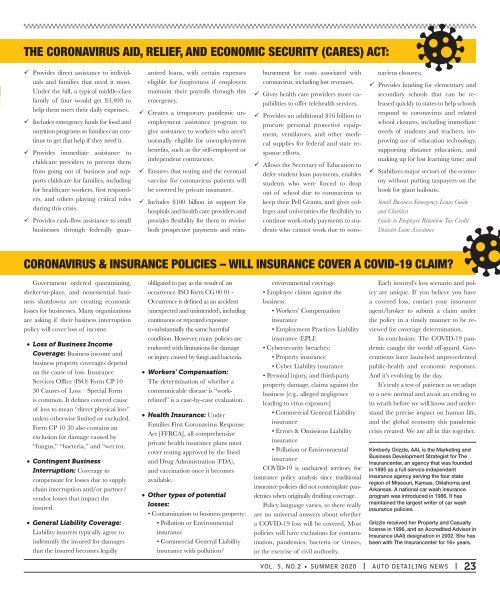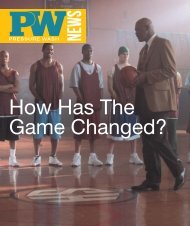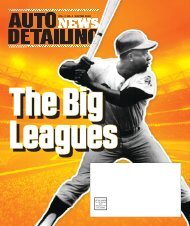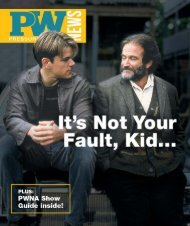Create successful ePaper yourself
Turn your PDF publications into a flip-book with our unique Google optimized e-Paper software.
THE CORONAVIRUS AID, RELIEF, AND ECONOMIC SECURITY (CARES) ACT:<br />
9 Provides direct assistance to individuals<br />
and families that need it most.<br />
Under the bill, a typical middle-class<br />
family of four would get $3,400 to<br />
help them meet their daily expenses.<br />
9 Includes emergency funds for food and<br />
nutrition programs so families can continue<br />
to get that help if they need it.<br />
9 Provides immediate assistance to<br />
childcare providers to prevent them<br />
from going out of business and supports<br />
childcare for families, including<br />
for healthcare workers, first responders,<br />
and others playing critical roles<br />
during this crisis.<br />
9 Provides cash-flow assistance to small<br />
businesses through federally guaranteed<br />
loans, with certain expenses<br />
eligible for forgiveness if employers<br />
maintain their payrolls through this<br />
emergency.<br />
9 Creates a temporary pandemic unemployment<br />
assistance program to<br />
give assistance to workers who aren’t<br />
normally eligible for unemployment<br />
benefits, such as the self-employed or<br />
independent contractors.<br />
9 Ensures that testing and the eventual<br />
vaccine for coronavirus patients will<br />
be covered by private insurance.<br />
9 Includes $100 billion in support for<br />
hospitals and health care providers and<br />
provides flexibility for them to receive<br />
both prospective payments and reimbursement<br />
for costs associated with<br />
coronavirus, including lost revenues.<br />
9 Gives health care providers more capabilities<br />
to offer telehealth services.<br />
9 Provides an additional $16 billion to<br />
procure personal protective equipment,<br />
ventilators, and other medical<br />
supplies for federal and state response<br />
efforts.<br />
9 Allows the Secretary of Education to<br />
defer student loan payments, enables<br />
students who were forced to drop<br />
out of school due to coronavirus to<br />
keep their Pell Grants, and gives colleges<br />
and universities the flexibility to<br />
continue work-study payments to students<br />
who cannot work due to coronavirus<br />
closures;<br />
9 Provides funding for elementary and<br />
secondary schools that can be released<br />
quickly to states to help schools<br />
respond to coronavirus and related<br />
school closures, including immediate<br />
needs of students and teachers, improving<br />
use of education technology,<br />
supporting distance education, and<br />
making up for lost learning time; and<br />
9 Stabilizes major sectors of the economy<br />
without putting taxpayers on the<br />
hook for giant bailouts.<br />
Small Business Emergency Loans Guide<br />
and Checklist<br />
Guide to Employee Retention Tax Credit<br />
Disaster Loan Assistance<br />
CORONAVIRUS & INSURANCE POLICIES – WILL INSURANCE COVER A COVID-19 CLAIM?<br />
Government ordered quarantining,<br />
shelter-in-place, and nonessential business<br />
shutdowns are creating economic<br />
losses for businesses. Many organizations<br />
are asking if their business interruption<br />
policy will cover loss of income.<br />
• Loss of Business Income<br />
Coverage: Business income and<br />
business property coverages depend<br />
on the cause of loss. Insurance<br />
Services Office (ISO) Form CP 10<br />
30 Causes of Loss – Special Form<br />
is common. It defines covered cause<br />
of loss to mean “direct physical loss”<br />
unless otherwise limited or excluded.<br />
Form CP 10 30 also contains an<br />
exclusion for damage caused by<br />
“fungus,” “bacteria,” and “wet rot.<br />
• Contingent Business<br />
Interruption: Coverage to<br />
compensate for losses due to supply<br />
chain interruption and/or partner/<br />
vendor losses that impact the<br />
insured.<br />
• General Liability Coverage:<br />
Liability insurers typically agree to<br />
indemnify the insured for damages<br />
that the insured becomes legally<br />
obligated to pay as the result of an<br />
occurrence. ISO Form CG 00 01 -<br />
Occurrence is defined as an accident<br />
(unexpected and unintended), including<br />
continuous or repeated exposure<br />
to substantially the same harmful<br />
condition. However, many policies are<br />
endorsed with limitations for damage<br />
or injury caused by fungi and bacteria.<br />
• Workers’ Compensation:<br />
The determination of whether a<br />
communicable disease is “workrelated”<br />
is a case-by-case evaluation.<br />
• Health Insurance: Under<br />
Families First Coronavirus Response<br />
Act [FFRCA], all comprehensive<br />
private health insurance plans must<br />
cover testing approved by the Food<br />
and Drug Administration (FDA),<br />
and vaccination once it becomes<br />
available.<br />
• Other types of potential<br />
losses:<br />
• Contamination to business property:<br />
• Pollution or Environmental<br />
insurance<br />
• Commercial General Liability<br />
insurance with pollution/<br />
environmental coverage<br />
• Employee claims against the<br />
business:<br />
• Workers’ Compensation<br />
insurance<br />
• Employment Practices Liability<br />
insurance (EPLI)<br />
• Cybersecurity breaches:<br />
• Property insurance<br />
• Cyber Liability insurance<br />
• Personal injury, and third-party<br />
property damage, claims against the<br />
business [e.g., alleged negligence<br />
leading to virus exposure]<br />
• Commercial General Liability<br />
insurance<br />
• Errors & Omissions Liability<br />
insurance<br />
• Pollution or Environmental<br />
insurance<br />
COVID-19 is uncharted territory for<br />
insurance policy analysis since traditional<br />
insurance policies did not contemplate pandemics<br />
when originally drafting coverage.<br />
Policy language varies, so there really<br />
are no universal answers about whether<br />
a COVID-19 loss will be covered. Most<br />
policies will have exclusions for contamination,<br />
pandemics, bacteria or viruses,<br />
or the exercise of civil authority.<br />
Each insured’s loss scenario and policy<br />
are unique. If you believe you have<br />
a covered loss, contact your insurance<br />
agent/broker to submit a claim under<br />
the policy in a timely manner to be reviewed<br />
for coverage determination.<br />
In conclusion: The COVID-19 pandemic<br />
caught the world off-guard. Governments<br />
have launched unprecedented<br />
public-health and economic responses.<br />
And it’s evolving by the day.<br />
It’s truly a test of patience as we adapt<br />
to a new normal and await an ending to<br />
its wrath before we will know and understand<br />
the precise impact on human life,<br />
and the global economy this pandemic<br />
crisis created. We are all in this together.<br />
Kimberly Grizzle, AAI, is the Marketing and<br />
Business Development Strategist for The<br />
Insurancenter, an agency that was founded<br />
in 1895 as a full service independent<br />
insurance agency serving the four state<br />
region of Missouri, Kansas, Oklahoma and<br />
Arkansas. A national car wash insurance<br />
program was introduced in 1986. It has<br />
maintained the largest writer of car wash<br />
insurance policies.<br />
Grizzle received her Property and Casualty<br />
license in 1996, and an Accredited Advisor in<br />
Insurance (AAI) designation in 2002. She has<br />
been with The Insurancenter for 16+ years.<br />
VOL. 5, NO.2 • SUMMER 2020 | AUTO DETAILING NEWS | 23

















